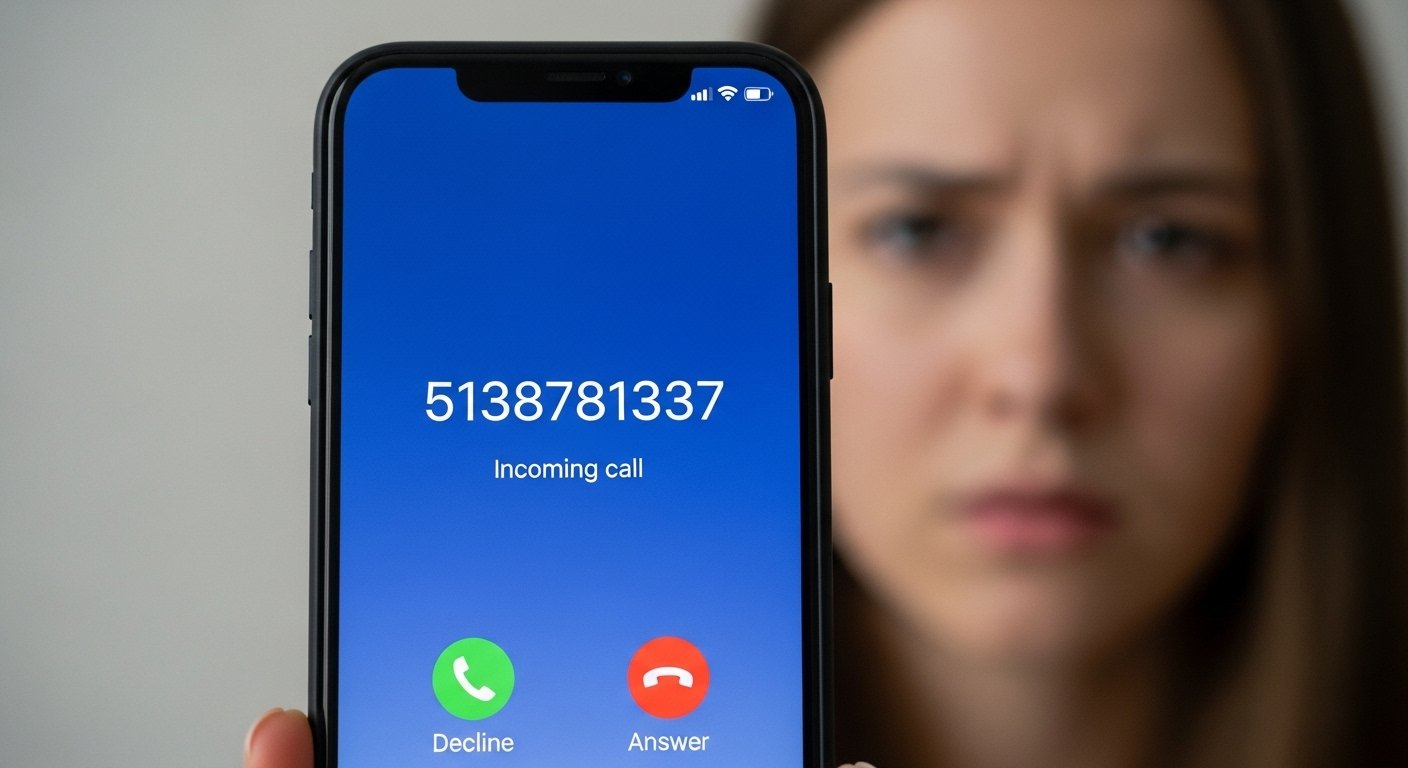Your phone rings, cutting through the quiet of your day. You glance at the screen, expecting a familiar name, but instead, you’re met with a string of digits: 5138781337. That moment of hesitation is universal. Do you answer? Is it important, or just another robocall? In our hyper-connected world, unknown numbers have become a source of constant annoyance and sometimes, genuine concern.
This specific sequence, 5138781337, is just one of millions of numbers that light up phones daily. While it’s tempting to search for a single, definitive answer to “Who called me from this number?” the reality is often more complex. This number could be a legitimate business, a misdialed call, or part of a wider telemarketing campaign. Understanding the nature of such calls empowers you to take control of your privacy and peace of mind. Let’s delve into what a call from 5138781337 might mean and how you can navigate the modern landscape of unsolicited calls.
What is the 5138781337 Number?
First, let’s break down the number itself. The area code 513 is a legitimate North American area code assigned to the southwestern region of Ohio, covering cities like Cincinnati and its surrounding suburbs. This immediately tells us that the call is originating from or spoofing a number within that geographic area. The remaining digits, 8781337, form the unique local exchange and line number.
It’s crucial to understand that caller ID is not a foolproof system. A practice known as neighbor spoofing is rampant. This is when scammers deliberately falsify the information transmitted to your caller ID display to mimic a number that looks familiar, often using your own area code. They do this to increase the likelihood of you answering. So, while the number 5138781337 shows an Ohio area code, the actual caller could be located anywhere in the world.
Common Reasons You Might Receive a Call from This Number
There isn’t one single entity behind this number. Based on user reports and general calling trends, calls from numbers like 5138781337 typically fall into a few categories.
Telemarketing and Robocalls
The most common culprit for unsolicited calls from unfamiliar numbers is telemarketing. This could be a live salesperson or, more frequently, an automated robocall. These calls can range from offers for vehicle warranties and student loan refinancing to home security systems and cruise vacations. They are often part of large, automated dialing campaigns that target thousands of numbers sequentially or at random.
Debt Collection Attempts
Another possibility is that the call is from a debt collection agency. Agencies often use multiple phone numbers to reach out regarding outstanding debts. If you have any accounts in collections, this could be a legitimate attempt to contact you. However, it’s important to know that legitimate collectors are required to follow specific rules, such as identifying themselves and providing written verification of the debt if requested.
Potential Phone Scams
This is the category that warrants the most caution. Scammers use phone calls as a primary tool for fraud. They might pretend to be from the IRS, a tech support company like Microsoft or Apple, or even a lottery organization. Their goals are to trick you into revealing personal information, such as your Social Security number or bank details, or to convince you to send money via wire transfer or gift cards. A number like 5138781337 can be easily spoofed and used in such malicious campaigns.
What to Do If You Get a Call from 5138781337
Your actions in the moment and afterward can protect you from waste of time and potential harm. Here is a practical guide on how to handle such calls.
Step 1: Don’t Answer Immediately
If you don’t recognize the number, the safest first step is to let it go to voicemail. Legitimate callers will almost always leave a message. Scammers and robocalls often do not. If the call is important, the person will leave a detailed voicemail stating their name, company, and reason for calling.
Step 2: Analyze the Voicemail (If Any)
Did they leave a message? Listen carefully. A legitimate business or contact will provide clear information. A robocall will often have a generic, pre-recorded message. A scammer might create a sense of urgency or threat, demanding immediate action or payment. If the message is vague, threatening, or promises a too-good-to-be-true prize, it’s a major red flag.
Step 3: Do Not Engage or Provide Information
If you do answer and realize it’s an unsolicited sales pitch or a potential scam, the best course of action is to hang up immediately. Do not press any buttons, even if the recording prompts you to “press 1 to speak to a representative” or “press 9 to be removed from the list.” This often just confirms your number is active, leading to more calls. Never, under any circumstances, provide personal or financial information over the phone to an unverified caller.
Step 4: Proactively Block the Number
After the call, you can take action to prevent future disturbances. Both iOS and Android devices allow you to block specific phone numbers. This won’t stop scammers from using a different spoofed number, but it will stop calls from that particular sequence, 5138781337.
How to Protect Yourself from Unwanted Calls
Dealing with a single unknown number is one thing; managing the constant barrage of spam calls is another. Here are some broader strategies to reclaim your phone’s peace and quiet.
Register with the National Do Not Call Registry
A fundamental step is to add your number to the [National Do Not Call Registry]. While this won’t stop scammers who operate outside the law, it should reduce the number of legitimate telemarketing calls you receive.
Utilize Your Phone’s Built-In Features
Modern smartphones have powerful features to help. Enable “Silence Unknown Callers” on iPhones or “Call Screen & Spam Protection” on Google Pixel phones. These features automatically send calls from numbers not in your contacts to voicemail, significantly reducing interruptions.
Consider a Third-Party Call-Blocking App
For even more robust protection, consider downloading a reputable call-identification and blocking app. Apps like Nomorobo, Hiya, or Truecaller use vast databases of reported numbers to identify and block spam calls before they even reach your phone, often displaying a “Spam Risk” warning on the incoming call screen.
Stay Informed and Skeptical
A healthy dose of skepticism is your best defense. Remember that government agencies like the IRS or Social Security Administration will almost always initiate contact via postal mail. No legitimate company will demand payment via gift cards. If a caller creates a sense of panic and demands immediate action, it’s almost certainly a scam.
Conclusion
The number 5138781337 serves as a perfect example of the modern communication dilemma. It is not uniquely malicious, but rather a single data point in a vast sea of unsolicited calls. The key takeaway is not to fixate on this one number, but to adopt a proactive and informed approach to all unknown callers. By letting suspicious calls go to voicemail, refusing to engage with scammers, and using the powerful tools available to block and filter calls, you can transform your phone from a source of anxiety back into the useful tool it was meant to be. Your time and privacy are valuable—guard them fiercely.
Frequently Asked Questions (FAQs)
1. Is 5138781337 definitely a scam number?
No, it is not definitively a scam. While it has been reported in connection with telemarketing and potential scams, it could also be a misdialed number or a call from a legitimate business using a spoofed local number. The context of the call and any voicemail left is the best indicator.
2. I answered a call from 5138781337 and now I’m worried. What should I do?
If you did not provide any personal or financial information, you are likely safe. Simply hang up if the call is ongoing. Be extra vigilant for any follow-up calls or phishing attempts via email. If you did share sensitive information, you should monitor your accounts closely and consider placing a fraud alert on your credit.
3. Can I sue someone for calling me from this number?
While you can report the number to the FTC and FCC, individually suing a caller is extremely difficult, especially since the number is likely spoofed. The actual caller is often untraceable or located overseas, making legal action impractical.
4. Why do these calls often use my own area code?
This is a tactic called “neighbor spoofing.” Scammers use local area codes to trick you into thinking the call is from someone nearby, like a local business or neighbor, which increases the chance you will answer the phone.
5. What is the most effective way to stop these calls for good?
There is no single “fix,” but a multi-layered approach is most effective. Combine the National Do Not Call Registry, your phone’s built-in silencing features, and a reputable third-party call-blocking app. This will significantly reduce, though likely not completely eliminate, unwanted calls.

